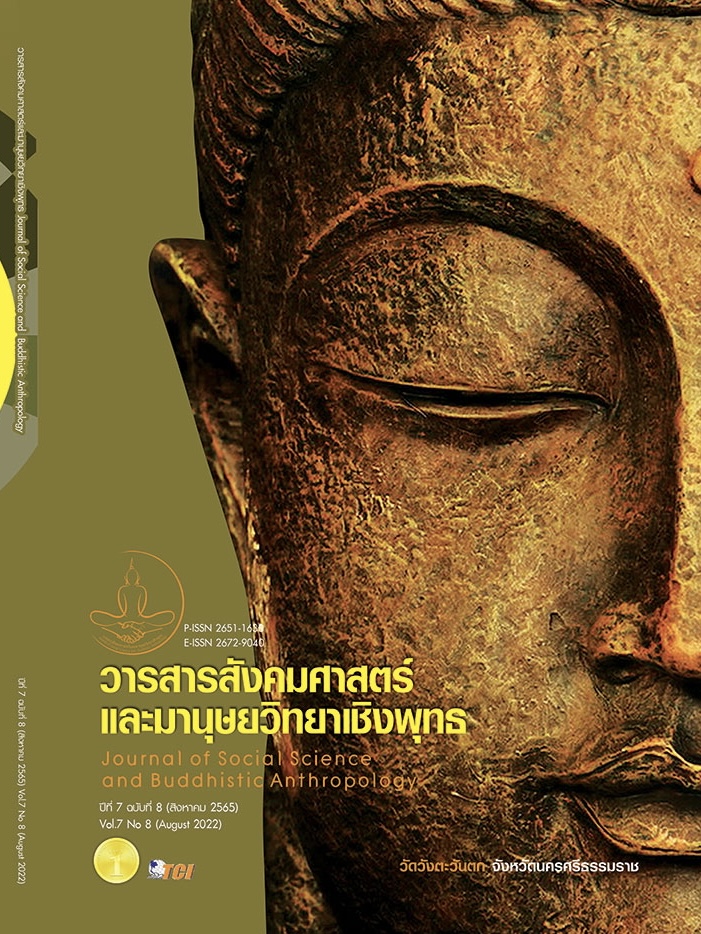LEADERSHIP FACTORS OF SCHOOL ADMINISTRATORS AFFECTING PRIMARY SCHOOL QUALITY IN THE THREE SOUTHERN BORDER PROVINCES
Keywords:
Leadership Factors, School Administrators, Primary School Quality, Three Southern Border ProvincesAbstract
The Objectives of this research article were to 1) study the level of leadership of primary school administrators in the three southern border provinces 2) study the quality of primary schools in the three southern border provinces 3) study the factors of leadership of school administrators that affect Quality of primary schools in the three southern border provinces 4) Examine the leadership factors of school administrators affecting the quality of primary schools in the three southern border provinces. Mixed research method The research sample consisted of 286 people, namely school administrators, teachers, school committees. Stratified sampling The tool used the questionnaire, interview form, the confidence value was .963 using software packages for analysis, including mean, standard deviation Pearson correlation coefficient Multiple regression analysis direct influence The corroborative component was tested. The results showed that 1) the level of school administrators leadership influenced the quality of primary schools. The overall picture is at a high level. The highest mean is in human relations. The mean is 4.48 2) Quality of primary schools in the three southern border provinces The overall picture is good. In terms of management process, the mean was 3.97 3) Leadership factors of school administrators affected the quality of primary schools. The forecast for the best predictor was leadership, morality and ethics, together to predict the leadership factors of school administrators affecting the quality of primary schools by 22.40 percent. It was statistically significant at .01 level. The hypothesis was that the leadership of the school administrators in at least one aspect had an effect on the quality of primary schools. Forecast in raw score format as follows: Raw score Ŷ=1.474 +.230 (Ethic) + .339 (Leadership) Standard score Ž = .213(Ethic) + .293 (Leadership) 4) Considering the confirmation component, it was found that it was consistent with the empirical data through the criteria. The index value was CMIN/p = 22.605 df = 1.610 P = .067 GFI = .982, RMSEA = .047 CFI = .995 AGFI = .995 TLI = .991 RMR = .008 CN = 298
References
กวี วงศ์พุฒ. (2542). ภาวะผู้นำ. กรุงเทพมหานคร: สถาบันพัฒนาวิสัยทัศน์นักบริหาร.
กันตพัฒน์ มณฑา. (2561). ปัจจัยที่ส่งผลต่อคุณภาพการศึกษาของโรงเรียนสังกัดสำนักงานเขตพื้นที่การศึกษา. กรุงเทพมหานคร: มหาวิทยาลัยสยาม.
ธีระ รุญเจริญ. (2553). ความเป็นมืออาชีพในการจัดและบริหารการศึกษา ยุคปฏิรูปการศึกษาเพื่อปฏิรูปรอบ 2 และประเมินภายนอกรอบ 3 (พิมพ์ครั้งที่ 6). กรุงเทพมหานคร: ข้างฟ่าง.
ธีระพล เพ็งจันทร์. (2555). การบริหารจัดการสถานศึกษา. อุดรธานี: มหาวิทยาลัยราชภัฏอุดรธานี.
บุญชม ศรีสะอาด. (2545). วิธีการสร้างสถิติสำหรับการวิจัย. กรุงเทพมหานคร: สวีริยาสาส์น.
ปราโมศ อิสโร. (2554). ภาวะผู้นำที่ส่งผลต่อประสิทธิผลการประกันคุณภาพภายในสถานศึกษา. ใน ดุษฎีนิพนธ์ครุศาสตรดุษฎีบัณฑิต สาขาวิชาภาวะผู้นำทางการบริหารการศึกษา. มหาวิทยาลัยทักษิณ.
รัตติภรณ์ จงวิศาล. (2556). ภาวะผู้นำ. กรุงเทพมหานคร: สำนักพิมพ์แห่งจุฬาลงกรณ์มหาวิทยาลัย.
ลัดดาวัลย์ เพชรโรจน์. (2555). การบริหารงานอุดมศึกษาสู่ความเป็นเลิศของมหาวิทยาลัยราช พฤกษ์. นนทบุรี: มหาวิทยาลัยราชพฤกษ์.
สมคิด สกุลสถาปัตย์. (2552). รูปแบบภาวะผู้นำการเปลี่ยนแปลงที่มีประสิทธิผลในการปฏิรูปการศึกษาแบบยั่งยืน. กรุงเทพมหานคร: มหาวิทยาลัยศิลปากร.
สมศักดิ์ สินธุระเวชญ์. (2542). มุ่งสู่คุณภาพการศึกษา. กรุงเทพมหานคร: วัฒนาพานิช.
สำนักงานคณะกรรมการการศึกษาขั้นพื้นฐาน. (2549). คู่มือการปฏิบัติงานคณะกรรมการศึกษาขั้นพื้นฐาน. กรุงเทพมหานคร: โรงพิมพ์การศาสนา.
Bateman, T. S. & Snell, S. A. (1999). Management: Building competitive advantage (4th ed.). Boston: Irwin McGrow-Hill.
Burns, J. M. (1978). Leadership. New York: Harper and Row.
Jung. D. I. et al. (1995). Bridging Leadership and Culture : A Theoretical. Consideration of Transformation Leadership and Collectivistie Cultures. Journal of Leadership Studie, 2(4), 22-27.
Yamane, T. (1973). Statistics: An introductory analysis. New York: Harper and Row.
Downloads
Published
How to Cite
Issue
Section
License
Copyright (c) 2022 Journal of Social Science and Buddhistic Anthropology

This work is licensed under a Creative Commons Attribution-NonCommercial-NoDerivatives 4.0 International License.









